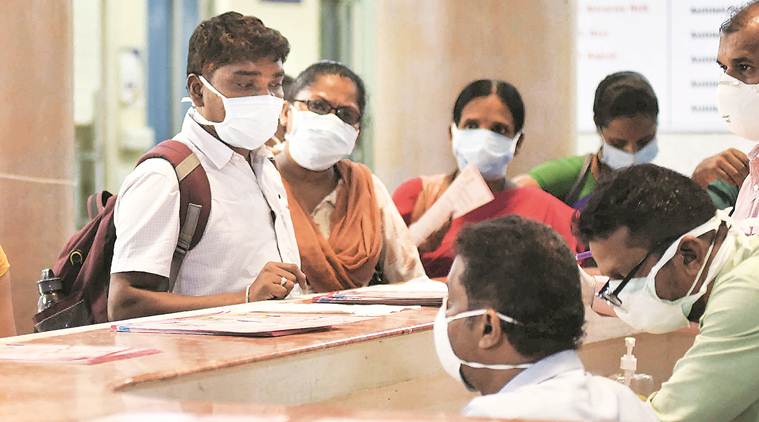 The Covid pandemic and the lockdown that entered its 42nd day on Tuesday have adversely affected people’s access to medical care across the country, (File photo)
The Covid pandemic and the lockdown that entered its 42nd day on Tuesday have adversely affected people’s access to medical care across the country, (File photo)
The Covid pandemic and the lockdown that entered its 42nd day on Tuesday have adversely affected people’s access to medical care across the country, hindering even the Ayushman Bharat-Pradhan Mantri Jan Arogya Yojana’s (AB-PMJAY) ability to cater to critical patients below the poverty line.
According to data provided by the National Health Authority (NHA), the number of treatments for 825 types of unique critical non-Covid procedures by both private and government facilities across the country dropped over 20 per cent between February and April. The number of procedures performed in these packages came down to 1,51,672 from 1,93,679 during this two-month period.
Within this, cancer-related procedures dropped around 57 per cent between February and April; cardiology by 76 per cent and procedures in obstetrics and gynaecology were down nearly 26 per cent.
Emergency room packages requiring less than 12 hours of stay also dipped around 33 per cent between February and April. These procedures have been grouped into 21 categories and other procedures in this list include general surgery and medicine, urology and neurosurgery.
Hospital challenge
Fear and lockdown are keeping patients away. But once easing begins, they will return to hospitals for key procedures. This is expected to add to the burden if the Covid curve continues to steepen.
Even when it comes to respiratory symptoms identified with Covid-like symptoms, procedures by both government and private healthcare facilities dropped by nearly 80 per cent, according to separate preliminary National Health Authority (NHA) data.
This when the government’s flagship healthcare scheme had expected its empanelled private hospitals to shoulder the burden of treatments like dialysis and chemotherapies. These trends also assume significance amid fears that easing of lockdown will spike case count and stretch the healthcare system.
Over 21,300 hospitals are empanelled with AB-PMJAY, including Apollo Hospitals Enterprise and HCG in Andhra Pradesh, HCG and Wockhardt Hospital in Maharashtra, Paras Global Hospital in Bihar, and Sir Ganga Ram and Medanta the Medicity in Delhi NCR. Private facilities account for 51 per cent of AB-PMJAY’s overall treatment.
“While our total daily treatments have gone down by more than 50 per cent, essential treatments like dialysis and chemotherapy have only gone down by 10-20 per cent,” said Indu Bhushan, CEO, NHA and AB-PMJAY. “This is some consolation, but we were actually expecting them to increase because many of the government facilities are not providing them at the moment. The private hospitals empanelled with us should have been able to take over,” he added.
But the sharp drop in procedures is also attributed to the fact that many private hospitals shut down during the lockdown.
“Treatment for some of these non-Covid cases is critical in a population like ours. Around 70 per cent of critical treatment like dialysis and chemotherapies were being provided by the private sector. Now we need to continue those operations,” said Bhushan. “This is the time that the private sector should be looking at a welfare maximisation model and not a profit maximisation model. Hopefully this will happen,” he had told The Indian Express.
The drop in treatment of respiratory ailments is also evident in the numbers. Severe Acute Respiratory Illnesses (SARI) and Influenza Like Illness (ILI) treatment at private healthcare facilities dropped about 76 per cent between the month of February up to April 27, nearly as much as the 81 per cent drop witnessed in these procedures by public facilities in the country, according to NHA.
“It is too soon to tell why public facilities are also witnessing a similar drop in SARI and ILI cases, but one reason could include the fear of patients to step out of their houses during this time. Some hospitals may also have reduced their operations,” said Bhushan.
“There is fear. Unlike in the West, here people do not go to the hospital on their own… All such patients want to avoid that hospitalisation for now as they fear that hospitals are the epicentres of infection,” said the CEO of a Bihar-based private hospital.
The NHA is still in the process of collating data on COVID procedures, for which it had announced reimbursement early in April. According to Bhushan, there is yet to be an uptick in private facilities claiming these reimbursements.
“We are not sure why more hospitals have not come forward when PMJAY is footing the bill for Covid-19 testing and treatment, but it is still early days, so we are expecting participation to increase,” Bhushan said.
At the same time, the NHA expects to bridge this gap by bringing more private healthcare facilities on board using its Hospital Empanelment Module (HEM)-Lite system to temporarily fast track approvals for empanelments during the pandemic.
Since then, the body has seen hospitals “trickling” in. As of May 4, the NHA has empanelled 53 hospitals, mostly from Assam, Uttar Pradesh, and Chhattisgarh. The NHA has also approved new hospitals for empanelment through the regular mechanism — 857 from states like Karnataka, Gujarat, Uttar Pradesh, Tamil Nadu, Rajasthan and Chhattisgarh.